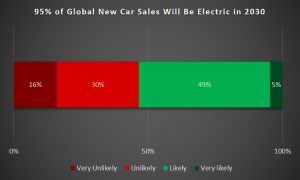Electric cars aren’t powered by diesel or petrol, so they don’t have an official miles per gallon figure. That said, there are ways of working out how efficient they are and even give them a rough miles per gallon.
How Many Kilowatt Hours is in a Gallon of Petrol? ⛽
The US governments fueleconomy.gov website calculates 1 (US) gallon of gasoline is equivalent to 33.7 kilowatt hours of energy – or kWh.
A US gallon is 3.785 litres, whereas in Canada and the UK a gallon is 4.546 litres. This means a (UK/Canadian) gallon of petrol is equivalent to 40.5 kWh of electricity.
Each litre of petrol is equivalent to 8.9 kWh.
Toyota Prius vs Nissan Leaf MPG
The Toyota Prius was once regarded as the sustainable choice for environmentally conscious drivers, but in recent times its crown has slipped a little. This might be partly because of Toyota’s inaccurate branding, claiming that it sells “self-charging cars”, when in reality a (very small) battery is charged by recovering motion which was achieved by burning petrol or diesel. That’s how most cars charge their 12-volt battery, it’s not self-charging! 😂 It’s also because electric cars are now more viable and mainstream.
The Nissan Leaf is currently the top-selling electric vehicle of all time (at least until the Model 3’s first quarter sales are released) so let’s use that for the comparison. An “efficient” hybrid vs an electric vehicle, how do they compare?
The Totoya Prius achieves 62.4mpg (UK/Canada) using 4.5 litres to travel 100 miles. The Nissan Leaf by comparison achieves the equivalent of 129.7mpg (UK/Canada) taking just 2.2 litres to travel 100 miles.
This highlights the efficiency of electric vehicles.
The Leaf uses less than half the energy of the Prius (the previous “gold standard”) to travel the same distance.
Efficiency
Internal combustion engine (ICE) powered cars convert around 12-30% of the petrol or diesel they consume into forward motion powering the wheels. This is because an ICE car loses over two-thirds of its energy through heat 🔥 and the transmission of power through the drivetrain.
Even the most inefficient electric vehicles translate at least 60% of the electricity stored in the battery into forward motion. If driven using regenerative braking (to re-capture energy, rather than scrubbing it off via breaking) EVs can be around 90% efficient!
How Big is an Electric Car’s Fuel Tank?
Here’s another interesting question, if an electric car had a fuel tank, how big would it be?
The Tesla Model 3 Standard Range Plus has a 50kWh battery, so if one US gallon of gasoline/petrol is equivalent to 33.7kWh, then the Tesla Model 3s equivalent petrol fuel tank would be 1.48 US gallons – or 5.62 litres.
That’s right, an electric car can achieve a range of 200 miles (275 if driven carefully in warm weather) on less than the equivalent of 6 litres of petrol!
You can also compare cars on a cost per mile basis, which is what I’m going to write about next, with the help of the new electric Mini!







